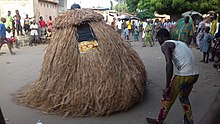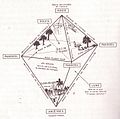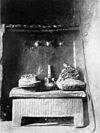Portal:Traditional African religions
Introduction The beliefs and practices of African people are highly diverse, including various ethnic religions. Generally, these traditions are oral rather than scriptural and are passed down from one generation to another through folk tales, songs, and festivals, and include beliefs in spirits and higher and lower gods, sometimes including a supreme being, as well as the veneration of the dead, and use of magic and traditional African medicine. Most religions can be described as animistic with various polytheistic and pantheistic aspects. The role of humanity is generally seen as one of harmonizing nature with the supernatural. In the past, African religion used to be referred to as 'traditional' but this is no longer appropriate. 'Traditional' was used to distinguish Africa religion from Abrahamic religion which came to the continent as a result of proselytism. Colonialism supported the false view that Africa had no religion. (Full article...) Selected articleThe Mandé creation myth is the traditional creation myth of the Mandé peoples of southern Mali. The story begins when Mangala, the creator god, tries making a balaza seed but it failed. Then he made two eleusine seeds of different kinds, which the people of Keita call "the egg of the world in two twin parts which were to procreate". Then Mangala made three more pairs of seeds, and each pair became the four elements, the four directions, as corners in the framework of the world's creation. This he folded into a hibiscus seed. The twin pairs of seeds, which are seen as having opposite sex, are referred to as the egg or placenta of the world. This egg held an additional two pairs of twins, one male and one female, who were the archetype of people. Selected imagesFestivalsThere are several religious festivals found in the various Traditional African religions. Some of these are listed below next to their corresponding religion :
Selected biography
Soumaoro Kanté (var.: Sumanguru Kanté) was a 13th-century king of the Sosso people. Seizing Koumbi Saleh, the capital of the recently defunct Ghana Empire, Soumaoro Kanté proceeded to conquer several neighboring states, including the Mandinka people in what is now Mali. However, the Mandinka prince Sundiata Keita built a coalition of smaller kingdoms to oppose him at the Battle of Kirina (c. 1235), defeating the Sosso and leaving Sundiata's new Mali Empire dominant in the region.
Soumaoro Kanté is portrayed as a villainous sorcerer-king in the national epic of Mali, the Epic of Sundiata. Selected quote
Ram Swarup quoted in Koenraad Elst (2002) Source: Swarup, Ram [in] Elst, Koenraad, Who is a Hindu? : Hindu Revivalist Views of Animism, Buddhism, Sikhism, and Other Offshoots of Hinduism, Voice of India (2002), p. 72, ISBN 9788185990743
Did you know
Related portalsTopicsFor more Traditional African religion topics, see Category:Traditional African religions.
CategoriesWikiProjectsThings you can doAssociated WikimediaThe following Wikimedia Foundation sister projects provide more on this subject:
Discover Wikipedia using portals |






































